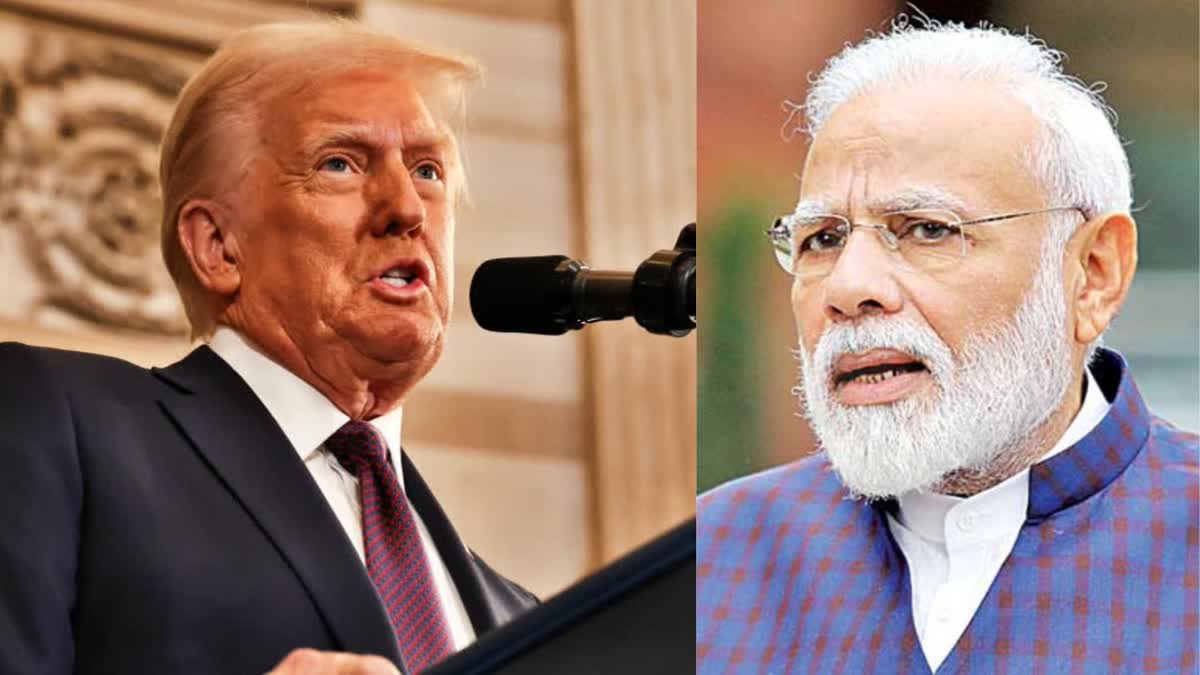New Delhi: As Donald Trump assumes the office of the 47th President of the United States, the global community will closely monitor his actions and decisions in the forthcoming days and weeks. His re-entry into the White House raises important questions regarding the future of relations between India and the United States.
It is pertinent to note that Trump served as the President of the United States from 2017 to 2020, a period marked by significant decisions that reshaped international relations. Notable actions included the withdrawal from the Paris Climate Agreement and the Iran nuclear deal, a historic meeting with North Korean leader Kim Jong Un, and the establishment of the Abraham Accords in West Asia. Relations between India and the US under the first term of Trump’s Presidency saw crucial developments. From defence to trade, the relationship has evolved amid geopolitical challenges.
Now what does Trump 2.0 mean for India-US ties? Will the ties flourish under his presidency?
ETV Bharat spoke to multiple strategic experts.
Vibhuti Jha, an expert on the US and ex-Republican candidate, said, “India and the United States share a mutual concern, and I have always maintained that I refrain from labelling them as the largest, strongest, oldest, or newest democracies. Instead, I assert that India and the U.S. stand as two of the most significant democracies in the world today. Both nations must identify common ground in their fundamental dreams and aspirations. To achieve this, I believe that Prime Minister Modi's initiative to transform India into a manufacturing powerhouse aligns seamlessly with President Trump's "Make America Great Again" agenda. Both leaders share a common goal: to enhance the economic and political strength of their respective countries, thereby fortifying their democracies.
“While India and the United States have numerous areas of convergence, it is important to acknowledge that we also possess distinct cultural and philosophical differences, which may lead to some divergences. However, I am optimistic that the camaraderie and personal rapport between Trump and Modi will enable them to recognize that for democracies and freedoms to prevail against the challenges posed by the so-called "woke army," collaboration is essential. In recent years, it has become evident that this "woke army" has been undermining democratic values, exploiting freedoms to their advantage. They have recognized that freedom can be a fault line within a democracy. This means that when adversaries begin to exploit your strengths to weaken you, it is imperative to fortify your defences.”, said Jha.
“The relationship between India and the United States is crucial, particularly as both nations align their initiatives like MAGA and Make in India. India stands as the largest market for American enterprises, a fact I have been advocating for quite some time. The goal is for India to emerge as a central hub for investment and technology, and India needs to embrace its role as a reliable partner to the United States. In America, we are committed to recognizing India as a valuable ally. There is a significant need for alignment between our countries. Notably, I want to highlight the presence of Mr. Jaishankar, India's External Affairs Minister, who attended a recent ceremony and broke traditional diplomatic norms by sitting in the front row, a position typically reserved for heads of state. This gesture underscores the importance of the ongoing negotiations between our nations. Additionally, it is vital to acknowledge that China poses a shared threat to democracy for both India and the United States, making it a key factor in the convergence of our interests”, Vibhuti Jha added.
Meanwhile, Prime Minister Modi Congratulated Trump as he took over as the 47th U.S. President. In a post on X, PM Modi said, “Congratulations my dear friend President @realDonaldTrump on your historic inauguration as the 47th President of the United States! I look forward to working closely together once again, to benefit both our countries and to shape a better future for the world. Best wishes for a successful term ahead”.
A day after Donald Trump assumed office as the 47th president of the United States, his choice for Secretary of State, Marco Rubio, is likely to meet with External Affairs Minister S. Jaishankar, along with their counterparts from Japan and Australia, on Tuesday, 21 January. According to sources, EAM Jaishankar will focus on finalizing the dates for the upcoming fifth Quad leaders' summit scheduled to take place in India later this year. Although official confirmations are still pending, both the US and India have indicated a willingness to hold an informal gathering of the four Quad foreign ministers.
External Affairs Minister Dr Jaishankar attended Trump’s swearing-in ceremony on Monday alongside leaders of China, Japan, Australia and others. "A great honour to represent India at the inauguration ceremony of President Donald J Trump and Vice President JD Vance in Washington DC today”, said EAM in a post on X.
It is worth noting that India-U.S. relations during Trump's first presidency faced several challenges despite the two countries having shared strategic interests in areas like defence, trade, and regional security. It may be recalled that under Trump's "America First" policy, the U.S. imposed tariffs on several Indian goods, including steel and aluminium, which strained trade relations. In 2018, the U.S. withdrew India from its Generalized System of Preferences (GSP), a move that affected Indian exports. India retaliated by raising tariffs on U.S. products, which led to a trade standoff, making it difficult to negotiate a comprehensive trade deal.
Trump's administration took a harder stance on immigration, which affected Indian professionals, especially those working in the U.S. on H-1B visas. India, which sends a significant number of skilled workers to the U.S., expressed concerns over restrictions on visa issuance and the tightening of rules around skilled labour. Policies like the "Buy American, Hire American" executive order directly impacted Indian IT firms and workers, leading to diplomatic tensions. Moreover, Trump’s decision to withdraw the U.S. from the Paris Climate Agreement in 2017 was a setback for global climate cooperation. India, which is one of the world’s largest greenhouse gas emitters, expressed disappointment with the U.S. stance, as both countries had been working together on clean energy initiatives. Under Trump, the U.S. adopted a more confrontational stance towards China, and India shared concerns about China’s growing influence in the Indo-Pacific region. While both nations aligned on this front, there were challenges in coordinating efforts, as India traditionally emphasizes a non-aligned foreign policy and has historical sensitivities regarding foreign military presence in its neighbourhood.
An analyst believes that the Trump administration has already begun its strategy, which appears to involve sending mixed signals to various countries. Initially, China will be a focal point, where he may indicate a commitment of around 60 per cent but ultimately settle for something closer to 10 or 15 per cent. This approach of conflicting messages will also extend to India.
“A positive development is the upcoming Quad meeting scheduled for today, which is a step in the right direction, even if it doesn't immediately translate into concrete policy changes. However, it does signal an intent from key figures within the Trump administration, such as Mike Waltz and Marco Rubio, who are focused on strengthening ties with India and its allies. Regionally, the U.S. seems to be shifting its focus from bilateral to regional considerations, which could bode well for India. We will need to observe the decisions made in the coming days, particularly regarding executive orders, as these will likely have significant global implications. For instance, actions related to energy and the Environmental Protection Agency could greatly influence the future direction of U.S. strategy. There are three main concerns for India regarding Trump's actions. First, his approach to bilateral trade will be crucial, and that's where the focus will begin. We will need to observe how this unfolds. Second, the Indo-Pacific strategy raises significant questions about the future of alliances under Trump's leadership”, Vivek Mishra, Deputy Director, Strategic Studies Programme, ORF and an expert on US foreign policy told ETVV Bharat.
“Thirdly, the regional strategy of the Indo-Pacific is just one aspect to consider; Trump's actions with his allies will significantly influence how India must adapt to various challenges. For instance, his dealings with Japan could have profound implications for Japanese strategy in the Indo-Pacific, which, in turn, would affect India. Recently, we've observed Japan taking steps regarding its approach to China, indicating a warming of relations. If this trend continues and we witness a thaw in Sino-Japanese relations, Japan may become more cautious in its Indo-Pacific stance due to increasing economic ties with China. Consequently, India must remain vigilant about these interconnected dynamics: the broader Indo-Pacific strategy, bilateral relations, and Trump's interactions with allies”, said Mishra.
On being asked if the America First rhetoric espoused by Trump may potentially conflict with India's interests, Mishra noted that part of this situation is likely due to policy decisions that have shaped it. “A country is trying to bring back most of its production and manufacturing, often referred to as on-shoring or near-shoring. This shift will bring various threats into the political landscape of the United States, affecting all nations, including India. India is not exempt from this. On the other hand, India has options. It can strengthen its resources and maintain its relationship with the United States while being prepared to take retaliatory actions if necessary. For instance, during the Trump administration, India implemented several countermeasures. This approach should remain an option because dealing with someone like Trump requires understanding how to make deals effectively. India will need to be firm on some issues while being flexible on others. Therefore, India's response to these tensions will likely be a combination of strategies”, added the strategic expert.
Abhijit Iyer Mitra, security expert and a senior fellow at the Institute of Peace and Conflict Studies (IPCS), said that overall, aside from tariffs, things are looking good for India-US relations. Under the previous administration, there were strong supporters of India like Jake Sullivan and Gina Raimondo. However, Antony Blinken, who had a different perspective, often criticized India in US religious freedom reports. This created divisions.
“When a president is not fully engaged, it's hard to manage these divisions. Biden is generally supportive of India, but he has limited focus. In contrast, Trump’s appointments are strongly anti-China, making China the focus of his policy. He sees Asia as the top priority, with India’s role becoming even more significant. Unlike Biden, Trump is willing to address the issue of Chinese manufacturing jobs directly”, Iyer added.
However, it is yet to be determined how the relationship will unfold in the coming few years under Trump. Will there be a change in Trump’s policy towards India remains the big question. Immigration and trade could likely be the challenge under Trump 2.0. Recently, Trump favoured increasing the number of skilled workers in the US, but trade remains a complicated issue. Not to forget, during his campaign, he called India the Tariff King. The new US president is set to visit India later this year for the Quad summit. This will mark the first time a sitting US president visits India in their first year, unlike previous presidents who went later in their terms.



